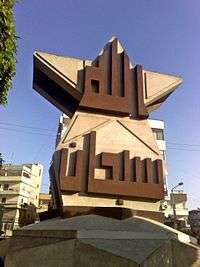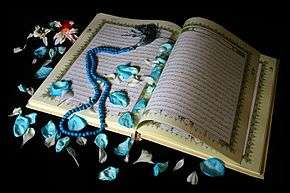Tasbih
Tasbīḥ (Arabic: تَسْبِيح) is a form of dhikr that involves the repetitive utterances of short sentences in glorification of Allah in Islam, by saying Subḥānallāh (سُبْحَانَ ٱللَّٰهِ, meaning "Glorified is Allah"). To keep track of counting either the phalanges of the right hand or a misbaha is used.[1]
| Part of a series on |
| God in Islam |
|---|
 |
|
List
|
|
|


Etymology
The term tasbeeh is based on in the Arabic root of sīn-bāʾ-ḥāʾ ({ح-ب-س}). The meaning of the root word when written means to glorify. 'Tasbeeh' is an irregular derivation from subhan, which is the first word of the constitutive sentence of the first third of the canonical form (see below) of tasbeeh. The word literally means, as a verb, "to travel swiftly" and, as a noun, "duties" or "occupation". However, in the devotional context, tasbih refers to Subhana Allah, which is often used in the Qur'an with the preposition 'an (عن), meaning "'God is [de]void' [of what they (polytheists) attribute to Him]" (Al-Tawba: 31, Al-Zumar: 67 et al.). Without this preposition, it means something like "Glory be to God."
Interpretation
The phrase translates to "Glory be to God" but a more literal translation is, "God is above [material things]". The root of the word سبحان (subḥān) is derived from the word سبح (sabaḥa = to swim/float on the surface), giving the phrase a meaning that God is above any imperfection or false descriptions.
The phrase often has the connotation of praising God for his total perfection, implying a rejection of any anthropomorphic elements or associations with God, or any attribution of mistakes or faults to him. Thus, it serves as testimony to God's transcendence (تنزيه, tanzīh).[2]
For example, the Quran says subḥāna llāhi ʿammā yaṣifūn[3] (37:159; "Glory be to God [who is free from] that which they describe") and subḥāna llāhi ʿammā yušrikūn[4] (52:43; "Glory be to God [who is free from] that which they associate with him").
The phrase is mentioned in the hadith Sahih Bukhari, VBN 5, 57, 50.[5]
There is no exact counterpart for this phrase in the English language, so all the above meanings combined hold the meaning of that word.[6]
Variants
Various Islamic phrases include the Tasbih, most commonly:
| Arabic Qurʾanic Spelling | Transliteration IPA | Phrase |
|---|---|---|
| سُبْحَانَ ٱللَّٰهِ سُبْحَٰنَ ٱللَّٰهِ | subḥāna -llāhi /sub.ħaː.na‿ɫ.ɫaː.hi/ | Glorified is Allah. |
| سُبْحَانَكَ ٱللَّٰهُمَّ سُبْحَٰنَكَ ٱللَّٰهُمَّ | subḥānaka -llāhumma /sub.ħaː.na.ka‿ɫ.ɫaː.hum.ma/ | Glorified are you, O Allah. |
| سُبْحَانَ ٱللَّٰهِ وَبِحَمْدِهِ سُبْحَٰنَ ٱللَّٰهِ وَبِحَمْدِهِ | subḥāna -llāhi wa-bi-ḥamdihī /sub.ħaː.na‿ɫ.ɫaː.hi wa.bi.ħam.di.hiː/ | Glorified is Allah and by His praise. |
| سُبْحَانَ رَبِّيَ ٱلْعَظِيمِ وَبِحَمْدِهِ سُبْحَٰنَ رَبِّيَ ٱلْعَظِيمِ وَبِحَمْدِهِ | subḥāna rabbiya l-ʿaẓīmi wa-bi-ḥamdihī /sub.ħaː.na rab.bi.ja‿l.ʕa.ðˤiː.mi wa.bi.ħam.di.hiː/ | Glorified is my Lord, the Great, and by His praise. |
| سُبْحَانَ رَبِّيَ ٱلْأَعْلَىٰ وَبِحَمْدِهِ سُبْحَٰنَ رَبِّيَ ٱلْأَعْلَىٰ وَبِحَمْدِهِ | subḥāna rabbiya l-ʾaʿlā wa-bi-ḥamdihī /sub.ħaː.na rab.bi.ja‿l.ʔaʕ.laː wa.bi.ħam.di.hiː/ | Glorified is my Lord, the Most High, and by His praise. |
| لَا إِلَٰهَ إِلَّا أَنْتَ سُبْحَانَكَ إِنِّي كُنْتُ مِنَ ٱلظَّالِمِينَ لَا إِلَٰهَ إِلَّا أَنْتَ سُبْحَٰنَكَ إِنِّي كُنْتُ مِنَ ٱلظَّٰلِمِينَ | lā ʾilāha ʾillā ʾanta subḥānaka ʾinnī kuntu mina ẓ-ẓālimīna /laː ʔi.laː.ha ʔil.laː ʔan.ta sub.ħaː.na.ka ʔin.niː kun.tu mi.na‿ðˤ.ðˤaː.li.miː.na/ | There is no God except You, glorified are you! I have indeed been among the wrongdoers. |
Usage
It is also often cited during the Islamic prayer (salat), supplication (dua), during a sermon (khutba) in the mosque and commonly throughout the day. It is sometimes used to express shock or amazement.
Muslims are also encouraged to say the phrase 33 times after prayer and throughout the day. Muhammad taught Muslims that it is one of the four praises that God likes Muslims to say continuously.
Fatimah bint Muhammad

In the early years of the marriage of Ali and Fatimah, Ali earned very little money and was unable to afford a servant for Fatimah. Fatimah’s hands were blistered from constant grinding; her neck had become sore from carrying water; her clothes had become dirty from sweeping the floor. One day Ali was aware that Muhammad had some servants, and advised Fatimah to ask him for one of his servants. Fatimah went, but she was unable to ask. Finally, Ali went with Fatimah to Muhammad's house. He did not accept their request, saying "there are many orphans (starved), I must sell these servants to feed them". Then Muhammad said "I will give you one thing better than helping of servant". He taught them a special manner of Dhikr which is known as the "tasbih of Fatimah".
- 33 repetitions of subḥāna -llahi (سُبْحَانَ ٱللَّٰهِ), meaning "Glorified is God". This saying is known as Tasbih (تَسْبِيح).
- 33 repetitions of al-ḥamdu lillāhi (ٱلْحَمْدُ لِلَّٰهِ), meaning "Glorified is God". This saying is known as Tahmid (تَحْمِيد).
- 34 repetitions of ʾallāhu ʾakbaru (ٱللَّٰهُ أَكْبَرُ), meaning "God is Greater [than everything]". This saying is known as Takbir (تَكْبِير).
Hadith
A hadith of the Prophet Muhammad relates:
Narrated by Abu Huraira: Some poor people came to the Prophet and said, "The wealthy people will get higher grades and will have permanent enjoyment, and they pray like us and fast as we do. They have more money by which they perform the Hajj and 'Umra, fight and struggle in Allah's Cause and give in charity." The Prophet said, "Shall I not tell you a thing upon which if you acted you would catch up with those who have surpassed you? Nobody would overtake you, and you would be better than the people amongst whom you live except those who would do the same. Say "Sub-han-al-lah", "Alhamdu-lillah" and "Allahu Akbar" thirty three times each after every (compulsory) prayer." We differed, and some of us said that we should say "Subhan-al-lah" thirty three times and "Alhamdu lillah" thirty three times and "Allahu Akbar" thirty four times. I went to the Prophet, who said: "Say, "Subhan-al-lah" and "Alhamdu lillah" and "Allahu Akbar" all together for thirty three times." (Book #12, Hadith #804)
Dhikr is of great importance to Muslims who believe it should be done as taught.[1]
See also
- Tasbih of Fatimah
- Al-hamdu lillahi rabbil 'alamin
- Hallelujah (Hebrew: הַלְּלוּיָהּ)
- Japamala
- Kombolói
- List of Islamic terms in Arabic
- Prayer beads
- Prayer rope
- Rosary
References
- "Is Using Prayer Beads An Innovation? - SeekersHub Answers". 2009-09-11. Retrieved 2016-09-28.
- al-Razi in his Mukhtar al-Sihah
- 37:159, Quran Surah As-Saaffaat ( Verse 159 )
- 52:43, Quran Surah At-Tur ( Verse 43 )
- Sahih Bukhari. "Sahih Bukhari : Book of "The Companions"". sahih-bukhari.com.
- "معنى كلمة التسبيح " سبحان الله وبحمده " - islamqa.info". islamqa.info.
Further reading
- Dubin, L. S. (2009). "Prayer Beads". In C. Kenney (Ed.), The History of Beads: From 100,000 B.C. to the Present. Revised and Expanded Edition. New York: Abrams Publishing. pp. 79–92.
- Henry, G., & Marriott, S. (2008). Beads of Faith: Pathways to Meditation and Spirituality Using Rosaries, Prayer Beads and Sacred Words. Fons Vitae Publishing.
- Untracht, O. (2008). "Rosaries of India". In H. Whelchel (ed.), Traditional Jewelry of India. New York: Thames & Hudson. pp. 69–73.
- Wiley, E., & Shannon, M. O. (2002). A String and a Prayer: How to Make and Use Prayer Beads. Red Wheel/Weiser, LLC.